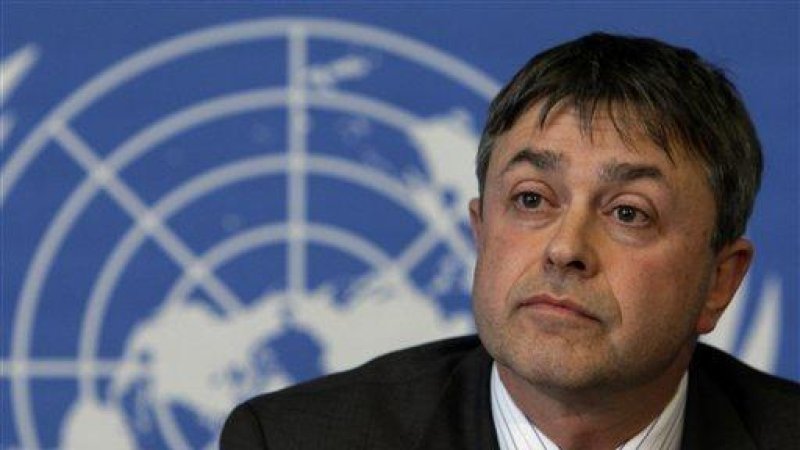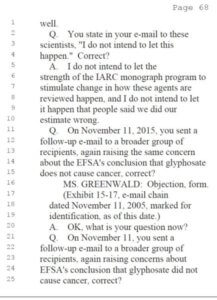Outgoing IARC Director, Christopher Wild, refused to attend the US House Science Committee hearing into the IARCgate scandal. In actions of arrogance never seen before at any UN agency, Wild is snubbing IARC’s single largest funder. To make matters worse, several days ago (on January 11), Wild wrote a regrettably undiplomatic letter to the honorable US Congressional leaders in language that was terse, insulting, demeaning and factually incorrect. As IARC is searching for a new head for this moral train-wreck of an agency, Wild seems determined to leave it in tatters.
As US lawmakers are surely befuddled by such ill-chosen lack of decorum (and by present standards in DC, that is saying something!), the Risk-Monger thought it worthwhile to be the one to answer to Chris Wild’s outrageous claims, trickery and misinformation. The following read-through of Wild’s loathe-letter to America will hopefully shine some light on how horrible IARC has become. It highlights six different ways Chris Wild, in his letter, lied to the US Congress.
Diversion
The clever wordsmithing here reveals much more about what IARC is trying not to admit than about what they did not know. To say that IARC was not aware of Portier’s association with law firms at the time of the publication of the glyphosate monograph is not worth very much. After all, everyone knows Portier had signed a very lucrative contract as a litigation consultant for two predatory law firms suing Monsanto sometime during the week after Monograph 112’s initial findings were published.
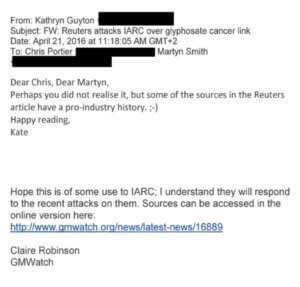
What Chris Wild neglected to acknowledge is how IARC’s glyphosate monograph lead author, Kate Guyton, was in regular contact with Portier in the two following years as their objectives to discredit EFSA aligned. The Portier Papers reveals emails where Guyton was sharing attack campaigns done on her behalf by rabid, anti-GMO campaigners like GMWatch’s Clare Robinson, who seems to have internal channels with the IARC anti-glyphosate lead, or how Guyton was aligning interviews for Portier and herself with anti-pesticide Le Monde journalists like Stéphane Foucart (for an anti-EFSA article).
I would find it unbelievable for Guyton to not have been aware of Portier’s lucrative remuneration set-up with the US predatory law firms given the amount of work she was coordinating on this activist scientist’s campaign schedule.
Portier portrayed himself as IARC’s self-acknowledged man in the trenches heroically there to defend all that the agency has been aiming to achieve as “agents of change”.
I believe this is what members of the US Congress would like to know more about, and such diversionary tactics to avoid coming clean here smells of lying.
Misinformation
What Wild states about Portier’s conflict of interest fails to align with what actually happened. In the original list of participants for the Monograph 112 Working Group, Portier was listed only by his US government affiliations (since “retired”). At the beginning of the meeting, Portier acknowledged that he worked for the American NGO, Environmental Defense Fund (hence the reason it was added only as a footnote in the final version). Others on the panel had conflicts of interest but they still stayed as full members of the IARC Working Group.
What is interesting here is that IARC was fully aware that Portier was working for the American anti-pesticides group but chose not to list that as Portier’s principal affiliation. I can only assume this emanates from the built-in anti-industry bias that has destroyed the agency’s credibility – they perhaps felt that only industry affiliations were conflicts of interest. If you took money from an NGO trying to falsely scare people with, say, a wristband that detected chemicals in the environment, you were assumed to be doing God’s work.
And besides, as Wild states, it was only a part-time job with the NGO, so it was only a little bit of a conflict of interest (and OK, maybe just an apparent conflict, and thus not “real”). So I suppose it was only a little bit of a lie.
Shouldn’t that director have already cleaned out his desk by now?
Deception
Putting a comma before an ‘and’ is poor English unless you are willfully creating a semi-colon mistake. Observers did have access to documents and could listen to discussions (comma) but only Working Group members and the Invited Specialist could join in the discussions. I can understand how people who don’t speak English as their first language could otherwise make such a mistake and the suggestion in this letter that Portier, like the observers, could not be involved in discussions was simply poor grammar and surely not a baldfaced lie.
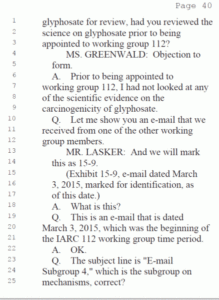 What Wild meant to say, I am sure, was that the only thing the Invited Specialist (Portier) could not do at the Working Group meetings was vote in the final decision on whether glyphosate was indeed carcinogenic, and at what level. This was probably for the best given that Portier had admitted in his deposition that prior to attending the glyphosate monograph meeting, he had never worked on glyphosate.
What Wild meant to say, I am sure, was that the only thing the Invited Specialist (Portier) could not do at the Working Group meetings was vote in the final decision on whether glyphosate was indeed carcinogenic, and at what level. This was probably for the best given that Portier had admitted in his deposition that prior to attending the glyphosate monograph meeting, he had never worked on glyphosate.
That nobody took notice of Portier’s behavior during the meeting should not be surprising – he was among friends at that meeting. Less than a year later, in January 2016, Portier was joined by IARC glyphosate Working Group members, Francesco Forastiere, Ivan I. Rusyn and Hans Kromhout in a private meeting with EU Commissioner Andriukaitis to lobby against the EFSA position. How the transport of these scientists was funded and who organized this fruitless meeting is a mystery that Kate will probably bring to her grave.
Misrepresentation
Wild’s defense of Portier’s role as chair of the Independent Advisory Group that recommended IARC’s coming programme of monographs is where the stench from this miserable little letter has caused me to open a window (in January mind you). What Wild neglected to say was that the chair of this independent panel had just finished a six-month residency at IARC directly under Kurt Straif (the head of IARC’s monograph programme) and just three days later chairing an independent panel. I suppose they saved on airfare for the good doctor!
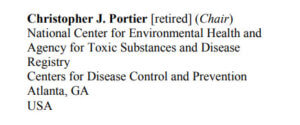 And what was Portier’s affiliation as chair of this “Independent” Advisory Group? During his six months at IARC, everyone seemed to know Chris as that statistician from EDF, but when the Advisory Group’s report was published, Portier’s affiliation once again reverted to his past glories. If I were a director at EDF, I would be a little annoyed at the lack of respect the NGO was getting for all they were paying this mercenary man. If I were the good doctor, I would also at times sign in as an employee at IARC. If I were the IARC director, I would be deeply ashamed of this entire scandal and immediately clean my desk out!
And what was Portier’s affiliation as chair of this “Independent” Advisory Group? During his six months at IARC, everyone seemed to know Chris as that statistician from EDF, but when the Advisory Group’s report was published, Portier’s affiliation once again reverted to his past glories. If I were a director at EDF, I would be a little annoyed at the lack of respect the NGO was getting for all they were paying this mercenary man. If I were the good doctor, I would also at times sign in as an employee at IARC. If I were the IARC director, I would be deeply ashamed of this entire scandal and immediately clean my desk out!
The last point of this paragraph opens up another can of smelly worms. In the months following the publication of the next five-year monograph programme, glyphosate was added to a previously planned monograph on four insecticides: tetrachlorvinphos, parathion, malathion and diazinon. According to the Portier Papers deposition, there was no credible justification for this late addition. So just like that, an herbicide was added to a monograph Working Group of a different class of pesticides. Couldn’t IARC have waited until a later monograph? What was the rush?
Who makes decisions like this? Either poor civil servants who don’t think very much or determined people with an agenda and an ax to grind. In the case of IARC, probably both!
Maybe Kate Guyton was rushed with the last-minute addition of glyphosate to the Monograph 112 substance list and had not had enough time to find sufficient literature to contribute to the Working Group preparation materials.
Now Wild’s letter gets very offensive.
I find it amusing that Christopher Wild is schooling US congressmen from the House Committee on Science, Space and Technology about how the US Agricultural Health Study (AHS) research is conducted and then trying to diminish the importance of the data it is producing (only two states?). How ignorant does Wild actually think these people are? As a Canadian wandering around policy centers in Brussels and often assumed by my accent to be American, I can validate how certain Brits in high places tend to be intellectually condescending towards Americans. This is indicative of the rampant arrogance at the heart of IARC that has put those overpaid functionaries to the point of being defunded by its largest member. Chris, I strongly suggest you write a second letter where you apologize for your disgraceful tone – shame on you!
That Wild is misinformed on his finger-wagging expedition provides just one more case study for my lecture hall on how to avoid falling into the “arrogance of ignorance” trap. The AHS data used by IARC, that the outgoing director smugly smears on, is from much earlier data publications and is not significant. What the chair of the IARC monograph 112 Working Group (on glyphosate), Aaron Blair, said in a sworn deposition is, however, very significant. Blair stated that if IARC had considered the AHS data he had at his disposal at the time of the glyphosate Working Group meetings, the outcome of IARC’s decision on glyphosate would have been quite different. Blair was one of the principal scientists in the AHS study.
Wild is admitting the AHS information contradicts his glyphosate Working Group findings … and … so … ? Chris, … if you need some help, this is the point in your letter where you ‘fess up’ and take responsibility.
OK, I forgot. At IARC, everybody else is wrong.
A leader should be able to see a situation clearly, know when difficult decisions need to be made and then have the courage to make them. IARC will reopen monographs when significant data makes it necessary to reconsider previous conclusions. In the case of the irrefutable AHS data, the revelations of inappropriate conduct by IARC staff, the clear evidence (and outrage) by the scientific community, the activist NGOs’ woeful abuse in misusing IARC’s hazard assessment findings as a battering ram to hit regulatory science, industry and public faith in farming and the food chain, … then it is time for a leader to step up, retract Monograph 112 and reopen the research with more objective experts.
The question is whether IARC’s Chris Wild has the courage to lead or will we have to wait for his successor to clean up his mess?
Obfuscation
This lying letter takes on a new device of deception: obfuscation.
Obfuscating might be clever, certainly is cunning, but, sorry, Chris, it is still lying. Aaron Blair did say the recent AHS data would have influenced the IARC decision on glyphosate. What you put in your letter is different. “Anything that was shown by Monsanto lawyers” is not referring to the AHS data. This question was planted by the plaintiff attorney (mainly for the benefit of NGO activists running the PR campaign against glyphosate) to try to repair the damage that a scientist, under oath, was forced to admit. Read the bloody Blair deposition Chris, and then we’ll talk!
So Chris, you accuse the US congressmen of being selective, but your own cunning methodology in parsing the English language was worse than selective, it was misleading (ie, lying). What your clever wordsmithing is trying to sell, well, I for one, ain’t buying.
The next five paragraphs of Chris Wild’s letter indicated a bizarrely rambling effort to show how other agencies keep information confidential (including the customary prerequisite IARC jab at those “pigs in Parma”) before we got at the main point he was trying to make: Please don’t try to gain access to our internal documents and emails (especially not Kate’s)!
So after brutally insulting the US Congress and the taxpayers they have been elected to represent, after ignoring their request to come to a Congressional hearing and after finding all means to lie to these lawmakers, Chris decides to close by saying he “would be grateful” if the “appropriate authorities” in the US (apparently not those from the US Committee on Science, Space and Technology) would not demand transparency or try to gain access to confidential IARC documents and emails. He wishes to keep “immunity”.
WOULD BE GRATEFUL??? Are you serious Chris? You forgot to say “Pretty Please”!
Dr. Wild, you are sitting on what is perhaps the greatest scandal to ever disgrace any UN agency, and rather than opening up the antics of your officials for scrutiny, you are continuing in some vain attempt at a cover-up and begging for immunity. I am not just referring to the disgraceful activist side-shows of Kate Guyton (whose email trail would probably sink the agency) or Kurt Straif’s dubious activities in that malignant hornet’s nest of activism known as Ramazzini.
Chris, it’s time to face the facts: It’s over! Haul your arse to Washington, bow your head in shame, open your records and allow people who have some accountability the opportunity to start rebuilding the agency whose name you have disgraced. Otherwise, you will be known as the last Director at IARC.
The hubris here is outrageous. The closing lines of this letter indicate that this little sanctuary from the real world in Lyon seriously thinks of itself as some noble bastion of international diplomacy, blue helmet heroics and world-class research. Maybe that is why they go around inflating themselves, citing their heroes and handing out medals of honor as if Charles de Gaulle were still lurking in the hallways. In reality, they are a rag-tag mishmash of second-rate activist scientists providing poorly-devised hazard assessments that they then use to undermine regulatory science. Wake up, Chris! At best your agency’s work should continue to be politely ignored; at worst you should be shut down.
Liar, Liar
This letter, submitted on 11 January 2018, is a watershed in moral depravity. It shows the many different manners of lying. In less than four short pages, IARC, in the name of its director, exemplified six different ways to not tell the truth: misinformation, diversion, deception, misrepresentation, obfuscation and the last form of lying: omission.
Omission
One final observation about your letter, Chris. You did not touch upon the most outrageous scandal raised in the Congressmen’s letter: that IARC edited out parts of the glyphosate monograph post-working group in order to make the glyphosate conclusions smell more “carcinogenic”. Surely, Chris, you must have some condescending riposte to put those stupid Americans in their place. Or is your only response to be “grateful” if they stopped demanding transparency and scrutiny and allowed IARC to continue on, business as usual? You omitted, in your letter, any discussion on the charge that IARC’s Monograph 112 on glyphosate lacks academic integrity.
Here is what I suspect about the slimiest part of IARCgate. There are internal IARC documents that discuss the reasons to edit out certain conclusions or evidence in the glyphosate monograph. They are likely not scientific since most of the glyphosate monograph lacks that virtue. Some of the editions were statistical, implying that the good Dr. Portier was probably involved (and he carelessly left an email trail).
Prove to me that my suspicions are wrong, Chris. Release all of the emails from Kate Guyton and Kurt Straif. Justify how Guyton’s message and her insistence back in 2016 to IARC Working Group members to not comply with US FOIA requests was not obstruction.
This request for confidentiality is not protecting members of IARC’s Working Groups (as you confusedly tried to explain); you are protecting IARC employees who likely broke standards of academic integrity.
- IARC needs to be transparent.
- IARC needs to be accountable.
- IARC needs to be respectful to its Member States.
- IARC needs to finally come clean and be honest.
The odd thing is that I was in Washington last month and had many coffees and discussions about all things IARC. My advice at all times was that I felt the US should not defund or pull out of IARC but try to reform the agency from within (with some “coalition of the rational” among IARC’s 25 Member States).
But when I witness such moral depravity, such bald-faced lying and such scum bubbling up on the shores of the Rhone river, maybe my past advice along the Potomac should be tempered. Maybe IARC has lost any legitimacy to continue to exist.
David Zaruk has been an EU risk and science communications specialist since 2000, active in EU policy events from REACH and SCALE to the Pesticides Directive, from Science in Society questions to the use of the Precautionary Principle. Follow him on Twitter @zaruk
This article was originally published at David Zaruk’s blog as “IARCgate: Shouldn’t IARC Stop Lying?” and has been republished here with permission.

